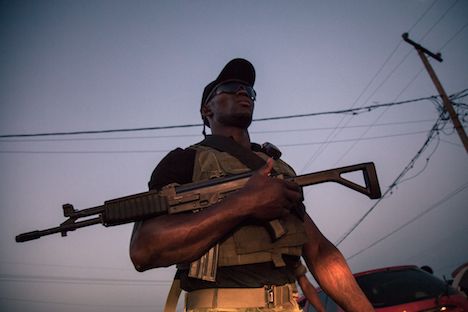|
By Jonathon Gatehouse | CBC News
Canadian Broadcasting Corporation
Friday, Jun 22, 2018
 |
| A soldier from the 21st Motorized Infantry Brigade patrols the streets of Buea, in South-West Region of Cameroon. A push for more autonomy by English-speakers has turned into a deadly armed conflict. (Alexis Huguet/AFP/Getty Images) |
Cameroon's government has issued a new report claiming that anglophone separatists have killed 81 soldiers and police, and attacked more than 120 schools, in a year-long uprising.
The violence in the English-speaking northwest and southwest regions of the mostly francophone country followed a series of peaceful 2016 strikes and protests for greater political autonomy, which were brutally suppressed by security forces.
“Statistics as of 11 June 2018 showed that 123 attacks had been carried out claiming 84 lives, including 32 soldiers, 42 gendarmes, seven police officers, two prison warders and one eco-guard,” says the report, presented at a news conference in Yaounde by Prime Minister Philemon Yang.
The government has also pledged to spend $29 million over the next year and half to help resettle some 75,000 people who have been displaced by the fighting, and is appealing for more international aid.
Anglophones make up about 20 per cent of Cameroon's population of 22 million, a legacy of the colonial era when the country was split between France and the U.K. But they have long complained that they are treated as second-class citizens, and those grievances have led to the push to create a new, independent state called “Ambazonia.”
The new report appears to be an attempt by the government to regain control of the narrative about the rebellion, following the publication of a damning report by Amnesty International last week.
The report, A turn for the worse: Violence and human rights violations in Anglophone Cameroon, said that civilians are paying the highest price. Thousands of locals are caught between the rebels -- who are murdering soldiers, attacking teachers and burning schools -- and a "heavy-handed" government response, which has included indiscriminate killings, the punitive destruction of villages, and torture.
"They tied our hands behind our backs, gagged us and tied our faces with our towels and shorts, which they tore," one villager, who was arrested by government troops in December, told Amnesty investigators. "They then made us lie in the water, face down, for about 45 minutes … During three days, they beat us with shovels, hammers, planks, and cables, kicked us with their boots and poured hot water on us … when I tried to move and shouted, one of them used the cigarette he was smoking to burn me."
Cameroon's Communications Minister Issa Tchiroma Bakary denounced the report as a collection of "crude lies, hasty deductions." The minister alleges that it is part of a foreign-led strategy to destabilize the nation.
Cameroon has also been battling the forces of Boko Haram, a spill-over from the fighting in neighbouring Nigeria's northeastern Borno State. Attacks and bombings by the militant group have killed more than 2,500 Cameroonians since 2014.
Yesterday, the Nigerian government announced that it intends to start repatriating 91,000 refugees -- people fleeing both conflicts -- to Cameroon in July, under a tripartite agreement signed with the UNHCR. It is being billed as a "safe, dignified and voluntary" return.
Source URL
|
 Print This Print This

|

